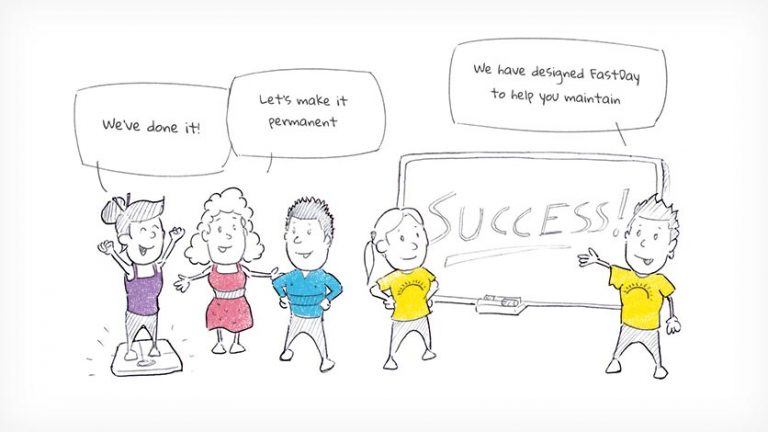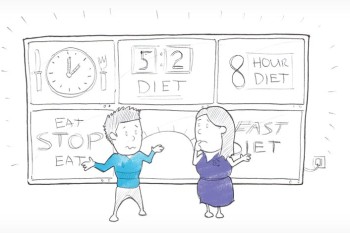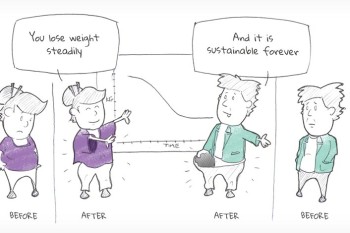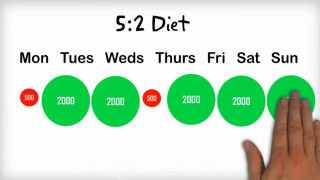If you’re thinking about entering maintenance: congratulations! You should celebrate your success in getting to this stage. Now it’s time to move on to create long-term success using fasting as your permanent Way of Eating. At FastDay we focus on the long-term view, not the short-term, quick fix approach weight loss that will not result in a permanent health improvement.
Maintaining a new lower weight is certainly not easy. Of the millions of people who lose weight each year, only a small proportion manage to keep the weight off. The numbers quoted vary from 2%1 to 20%,2 most of which depends on your definition of success. However you calculate the numbers, though, it is clear that there is a lot more to successfully maintaining a lower weight than just reaching your goal weight. One of the reasons weight maintenance is so hard is that after losing weight our bodies try to regain the fat stores just in case another famine is around the corner! Learn about what happens to our metabolism when we lose weight
With intermittent fasting, you have the tools to keep the weight off:
- Fasting combats many of the body’s mechanisms to try to trick you into regaining the weight
- Intermittent fasting is very flexible allowing you to adjust your maintenance plan as you go along
- Intermittent fasting means not having to be on a diet for the rest of your life.
Have confidence that your Way of Eating will give you control over your weight now and in the future!
FastDay’s top 5 tips for successful maintenance
1. Work out your plan for the future
Fasting for maintenance usually means a different pattern: perhaps fasting just one day a week (6:1) or increasing your calorie allowance on a 5:2 pattern; moving to an eating window approach. You may need to experiment for a while to work out what suits you best.
-
Decide on an acceptable weight range beyond which you need to take action. We suggest you allow yourself at least 1kg either side of your goal weight to allow for normal daily weight variations. Remember that your daily calorie needs will change if you do more/less exercise and with changes in circumstances, you may need to adjust your fasting to compensate.
-
Have an action plan in place for when you see an increase/decrease in weight that you cannot put down to normal daily weight variations – perhaps you will fast for an extra day or avoid sugar for a week – until your weight returns to target.
- Respond to quickly when your weight strays out of your acceptable range – the longer you leave it, the harder it may be to return to target.
Read about different methods of intermittent fasting
2. Keep using FastDay every day or at least on most days
It is important to keep tracking your weight and other measures. Even when you have worked out a method that keeps your weight stable, continuing with tracking your weight is worthwhile. It is all too easy to become a little complacent and gain weight without really noticing unless you keep on tracking. You might not notice that you are always eating more than your calorie allowance on your fast days, or are shortening the length of your fasts, or that you are eating more snacks or treats on non-fast days than you were, or that you are skipping fast days because they are not convenient. People who weigh themselves regularly have been shown to be more likely to maintain their weight loss.
-
Keep entering your weight and other data on the FastDay progress tracker.
-
Check in regularly with the FastDay community for support and ideas on how to keep your weight maintenance on track. There is a thread on the FastDay forum each month for maintainers to post how their maintenance is going.
3. Keep motivated
When we are losing weight, we have the excitement of regular new numbers on the scales or tape measure to look forward to. When maintaining there should be no surprises on the scales or tape measure. You won’t get any ‘have you lost weight?’ comments to make you feel proud. Nobody seems to congratulate you for staying the same size! It is hard to keep motivated when we do not see a ‘reward’ for our efforts.
Ideas on how to maintain motivation:
-
Visit the FastDay forum and connect with other maintainers
-
Calculate how much weight gain you have avoided! Suppose that on each fast day you are eating 1000 calories less than on you do on your non-fast days, then each week you are ‘saving’ 2000 calories. If it is true that 1kg of fat is ‘worth’ 7000 calories then each week you have prevented a fat gain of 300g or over 1 kg per month of successful maintaining!
-
Celebrate your maintenance anniversaries: the first month, 6 months, 1 year, 2 years etc. by posting on FastDay and inviting people to congratulate you. Or treat yourself to a non-food-based reward like new clothes.
-
Post your story on the FastDay inspirational stories section to advertise your success and give you that feel-good factor once more. Write a blog about your journey, and share pictures with your friends.
-
Have a maintenance buddy from the FastDay community so you can encourage each other.
-
Mentor people who are currently trying to lose weight, giving them much needed support but at the same time reminding you on how well you have done.
4. Keep on exercising
Many people will increase their exercise to help lose excess weight, but when the goal weight is reached, perhaps they ease up on their exercise levels. This combined with the now lower energy needs due to weight loss can be a recipe for weight regain.
-
Toning your muscles through exercise can further improve your body shape and composition – you will look and feel even better!
-
Exercise brings so many health benefits there is no need to reduce it now you have lost weight.
-
If the exercise plan you are currently following is losing its appeal, look for alternatives.
Read about exercise and fasting
5. When you get knocked off course, get straight back on again
Changes in routine such as holidays, or going through a busy, stressful time, can result in changes in eating habits – and you may decide to reduce or skip some fasting. When you have the stress under control, or the holidays are over, it’s time to return to fasting. One of the great joys of IF is that a maintainer can simply have a burst of more intensive fasting for a few weeks to get back to target weight if something in life causes them to have put some weight on. It can sometimes be hard to return to your old routine after these changes but if you keep delaying re-starting you risk continued weight gain.
-
Plan in advance when you will do your first fast
-
Tell people about your plan – post about it in the FastDay community
-
Make sure you stick to the plan
-
Once you have got that first fast out of the way, you will soon be back in the old routine and any weight gained will disappear.
Learn about stress and fasting
Characteristics of successful maintainers
Surprisingly, there have been very few scientific studies looking at what makes for a successful weight-loss maintainer. One study in which researchers studied 4000 people who had lost at least 13.6 kg (30 lb) and kept it off at least one year (average loss 33kg, average duration of maintenance five and a half years) was able to identify several features that characterised successful weight maintenance.3,4 These included:
-
Keeping their calorie consumption under control
-
Doing high levels of physical activity
-
Weighing themselves frequently.
People who had failed to maintain their weight loss were more likely to have suffered from depression, to have episodes of bingeing or to have lost relatively small amounts of weight.
But the most important factor of all was how long people had successfully maintained their weight loss: those who had kept their weight off for two years or more had a nearly 50% better chance of continuing to maintain their weight over the following year. The longer you can keep the weight off, the easier it will be for your new weight to become permanent.















